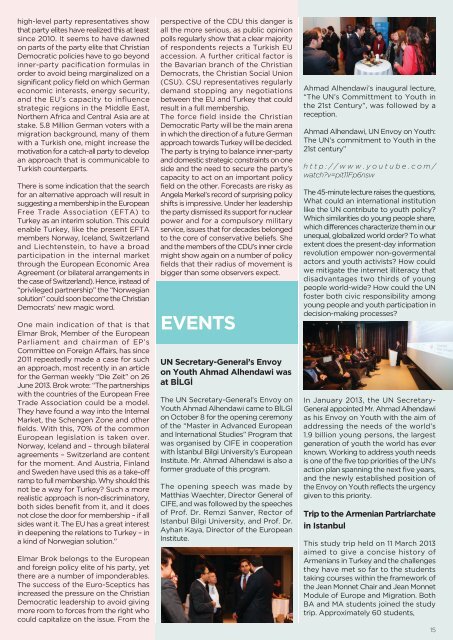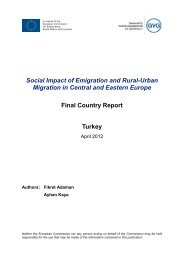NEWSLETTER - İstanbul Bilgi Üniversitesi | AB Enstitüsü
NEWSLETTER - İstanbul Bilgi Üniversitesi | AB Enstitüsü
NEWSLETTER - İstanbul Bilgi Üniversitesi | AB Enstitüsü
Create successful ePaper yourself
Turn your PDF publications into a flip-book with our unique Google optimized e-Paper software.
high-level party representatives show<br />
that party elites have realized this at least<br />
since 2010. It seems to have dawned<br />
on parts of the party elite that Christian<br />
Democratic policies have to go beyond<br />
inner-party pacification formulas in<br />
order to avoid being marginalized on a<br />
significant policy field on which German<br />
economic interests, energy security,<br />
and the EU’s capacity to influence<br />
strategic regions in the Middle East,<br />
Northern Africa and Central Asia are at<br />
stake. 5.8 Million German voters with a<br />
migration background, many of them<br />
with a Turkish one, might increase the<br />
motivation for a catch-all party to develop<br />
an approach that is communicable to<br />
Turkish counterparts.<br />
There is some indication that the search<br />
for an alternative approach will result in<br />
suggesting a membership in the European<br />
Free Trade Association (EFTA) to<br />
Turkey as an interim solution. This could<br />
enable Turkey, like the present EFTA<br />
members Norway, Iceland, Switzerland<br />
and Liechtenstein, to have a broad<br />
participation in the internal market<br />
through the European Economic Area<br />
Agreement (or bilateral arrangements in<br />
the case of Switzerland). Hence, instead of<br />
“privileged partnership” the “Norwegian<br />
solution” could soon become the Christian<br />
Democrats’ new magic word.<br />
One main indication of that is that<br />
Elmar Brok, Member of the European<br />
Parliament and chairman of EP’s<br />
Committee on Foreign Affairs, has since<br />
2011 repeatedly made a case for such<br />
an approach, most recently in an article<br />
for the German weekly “Die Zeit” on 26<br />
June 2013. Brok wrote: “The partnerships<br />
with the countries of the European Free<br />
Trade Association could be a model.<br />
They have found a way into the Internal<br />
Market, the Schengen Zone and other<br />
fields. With this, 70% of the common<br />
European legislation is taken over.<br />
Norway, Iceland and – through bilateral<br />
agreements – Switzerland are content<br />
for the moment. And Austria, Finland<br />
and Sweden have used this as a take-off<br />
ramp to full membership. Why should this<br />
not be a way for Turkey? Such a more<br />
realistic approach is non-discriminatory,<br />
both sides benefit from it, and it does<br />
not close the door for membership – if all<br />
sides want it. The EU has a great interest<br />
in deepening the relations to Turkey – in<br />
a kind of Norwegian solution.”<br />
Elmar Brok belongs to the European<br />
and foreign policy elite of his party, yet<br />
there are a number of imponderables.<br />
The success of the Euro-Sceptics has<br />
increased the pressure on the Christian<br />
Democratic leadership to avoid giving<br />
more room to forces from the right who<br />
could capitalize on the issue. From the<br />
perspective of the CDU this danger is<br />
all the more serious, as public opinion<br />
polls regularly show that a clear majority<br />
of respondents rejects a Turkish EU<br />
accession. A further critical factor is<br />
the Bavarian branch of the Christian<br />
Democrats, the Christian Social Union<br />
(CSU). CSU representatives regularly<br />
demand stopping any negotiations<br />
between the EU and Turkey that could<br />
result in a full membership.<br />
The force field inside the Christian<br />
Democratic Party will be the main arena<br />
in which the direction of a future German<br />
approach towards Turkey will be decided.<br />
The party is trying to balance inner-party<br />
and domestic strategic constraints on one<br />
side and the need to secure the party’s<br />
capacity to act on an important policy<br />
field on the other. Forecasts are risky as<br />
Angela Merkel’s record of surprising policy<br />
shifts is impressive. Under her leadership<br />
the party dismissed its support for nuclear<br />
power and for a compulsory military<br />
service, issues that for decades belonged<br />
to the core of conservative beliefs. She<br />
and the members of the CDU’s inner circle<br />
might show again on a number of policy<br />
fields that their radius of movement is<br />
bigger than some observers expect.<br />
EVENTS<br />
UN Secretary-General’s Envoy<br />
on Youth Ahmad Alhendawi was<br />
at BİLGİ<br />
The UN Secretary-General’s Envoy on<br />
Youth Ahmad Alhendawi came to BİLGİ<br />
on October 8 for the opening ceremony<br />
of the “Master in Advanced European<br />
and International Studies” Program that<br />
was organised by CIFE in cooperation<br />
with <strong>İstanbul</strong> <strong>Bilgi</strong> University’s European<br />
Institute. Mr. Ahmad Alhendawi is also a<br />
former graduate of this program.<br />
The opening speech was made by<br />
Matthias Waechter, Director General of<br />
CIFE, and was followed by the speeches<br />
of Prof. Dr. Remzi Sanver, Rector of<br />
Istanbul <strong>Bilgi</strong> University, and Prof. Dr.<br />
Ayhan Kaya, Director of the European<br />
Institute.<br />
Ahmad Alhendawi’s inaugural lecture,<br />
“The UN’s Committment to Youth in<br />
the 21st Century”, was followed by a<br />
reception.<br />
Ahmad Alhendawi, UN Envoy on Youth:<br />
The UN’s commitment to Youth in the<br />
21st century”<br />
http://www.youtube.com/<br />
watch?v=pit11Fp6nsw<br />
The 45-minute lecture raises the questions,<br />
What could an international institution<br />
like the UN contribute to youth policy?<br />
Which similarities do young people share,<br />
which differences characterize them in our<br />
unequal, globalized world order? To what<br />
extent does the present-day information<br />
revolution empower non-govermental<br />
actors and youth activists? How could<br />
we mitigate the internet illiteracy that<br />
disadvantages two thirds of young<br />
people world-wide? How could the UN<br />
foster both civic responsibility among<br />
young people and youth participation in<br />
decision-making processes?<br />
In January 2013, the UN Secretary-<br />
General appointed Mr. Ahmad Alhendawi<br />
as his Envoy on Youth with the aim of<br />
addressing the needs of the world’s<br />
1.9 billion young persons, the largest<br />
generation of youth the world has ever<br />
known. Working to address youth needs<br />
is one of the five top priorities of the UN’s<br />
action plan spanning the next five years,<br />
and the newly established position of<br />
the Envoy on Youth reflects the urgency<br />
given to this priority.<br />
Trip to the Armenian Partriarchate<br />
in Istanbul<br />
This study trip held on 11 March 2013<br />
aimed to give a concise history of<br />
Armenians in Turkey and the challenges<br />
they have met so far to the students<br />
taking courses within the framework of<br />
the Jean Monnet Chair and Jean Monnet<br />
Module of Europe and Migration. Both<br />
BA and MA students joined the study<br />
trip. Approximately 60 students,<br />
15



